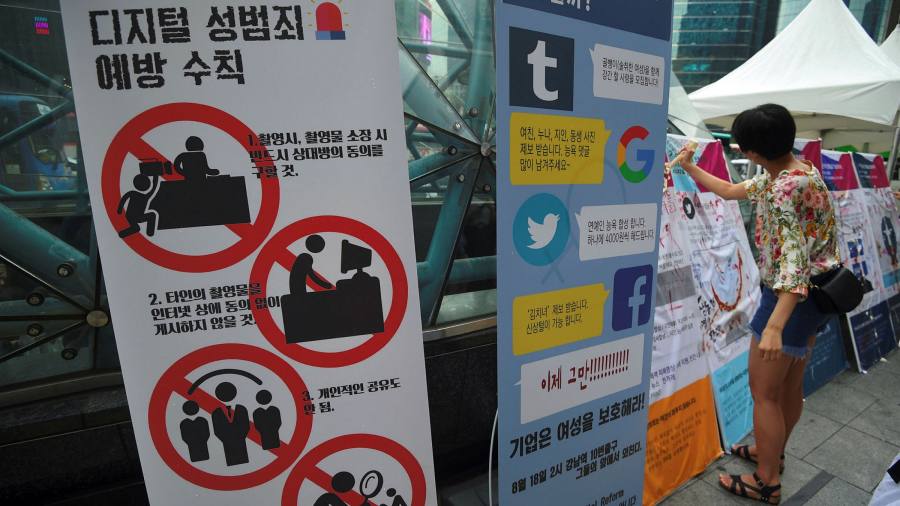South Korea’s cutting edge technology has abetted a wave of digital sex crimes targeting young women and girls.
According to victims, researchers and advocacy groups, South Korea is the global centre for illegal filming and sharing of explicit images and videos.
Digital technologies, including high-speed streaming and encrypted chat rooms, have provided new vehicles for propagating deeply embedded gender discrimination and disseminating material depicting sexual violence against women.
“South Korea, unfortunately, has been ahead of the curve on the prevalence, variety and seriousness of digital sex crimes,” said Heather Barr, co-director of women’s rights at Human Rights Watch.
The country boasts the world’s highest rate of adult smartphone ownership and among its fastest internet speeds, with 99.5 per cent of households having access to the internet. It was also the first country to launch 5G service.
A new HRW report based on interviews with victims and their families highlights that the crimes commonly involve intimate images captured and disseminated both by strangers and women’s acquaintances.
In one case, Lee Ye-rin* discovered a clock given as a gift by an employer had been streaming footage from inside her bedroom for weeks.
“What happened took place in my own room — so sometimes . . . in my own room, I feel terrified without reason,” Lee said. She added that a year after the crime was discovered, she still relies on prescription medicine to combat depression and anxiety.
Kang Yu-jin*, another victim, was forced to quit her job and move house after a former partner published private photos alongside identifiable details including her home and office addresses.
“There were men who wanted to contact me at the church where my parents attended . . . and there were men who sent me [messages] to have sex. There were also men who came to my home and work,” she said.
Researchers noted that beyond the dangers of stigma and harassment, suicide is also prevalent.
“I’m quite afraid of my future,” said Oh Soo-jin*, another victim. “It’s going to always be on someone’s computer . . . [I thought] ‘I want this to stop’ but this problem will never end . . . So if this can’t stop, I want to stop my life.”
While digital sex crimes are a global problem, the report published on Wednesday by US-based HRW has also exposed South Korea’s comparatively light punishments and lack of protection for victims of digital sex crimes.
“Officials in the criminal legal system — most of whom are men — often seem to simply not understand, or not accept, that these are very serious crimes . . . Survivors are forced to deal with these crimes for the rest of their lives with little assistance from the legal system,” Barr said.
Despite heightened public awareness and legal reforms, the number of sex crime cases involving illegal filming has continued to rise.
Last year, student researchers and police uncovered a secret chatroom on the Telegram messaging app that contained images of child sexual abuse. The material was viewed by 260,000 people, according to estimates by Korea Cyber Sexual Violence Response Center.
According to the Women’s Human Rights Institute of Korea, the number of cases linked to illegal filming and distribution of images and videos numbered almost 7,000 last year, up 70 per cent from 2019, demonstrating increased reporting efforts.
But few cases are punished. Prosecutors dropped 44 per cent of digital sex crime cases in 2019, while almost 80 per cent of those convicted of capturing intimate images without consent received a suspended sentence, a fine or a combination of the two, in 2020, HRW said.
Last year, a Korean court rejected a US extradition request for a man convicted of running one of the world’s biggest child pornography websites after he was sentenced to just 18 months in prison for violating South Korean child protection laws.
The government has been criticised for failing to address gender inequality, which analysts say fuels digital sex crimes.
A female air force sergeant took her own life last month after being sexually harassed by a male colleague and the air force allegedly tried to cover up the case. Her death sparked public uproar, forcing Lee Seong-yong, the air force chief, to resign.
Despite calls for tougher action following a string of high-profile #MeToo cases involving K-pop stars and senior politicians, little progress has been made to stop the abuse of women across South Korea’s patriarchal society.
The country ranked 102 out of 156 in the 2021 World Economic Forum Global Gender Gap report, with the largest gender disparity in economic participation and opportunity of any advanced economy.
According to HRW, South Korean women do four times as much unpaid work as men and earn 32.5 per cent less.
“The root cause of digital sex crimes in South Korea is widely accepted harmful views about and conduct toward women and girls that the government urgently needs to address,” said Barr.
*Names have been changed
If you have been affected by anything in this story and need help, you can reach Lifeline Korea at 1588-9191. In the UK, the Samaritans are on 116 123. The National Suicide Prevention Lifeline in the US is on 1-800-273-8255.

